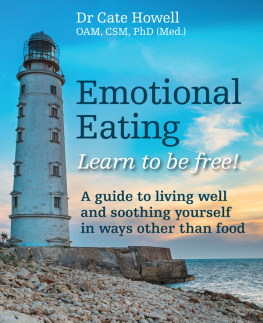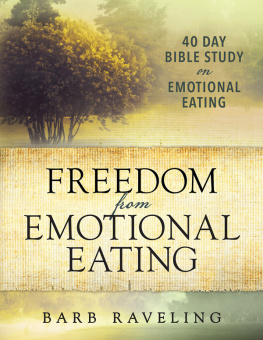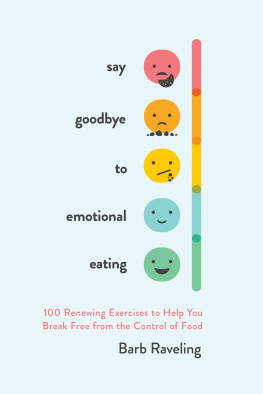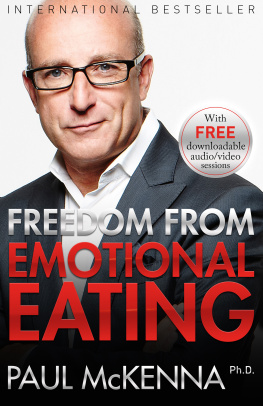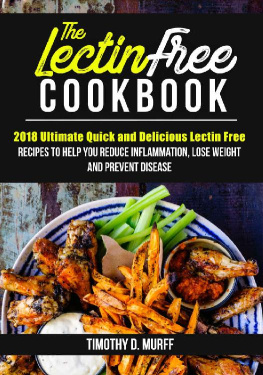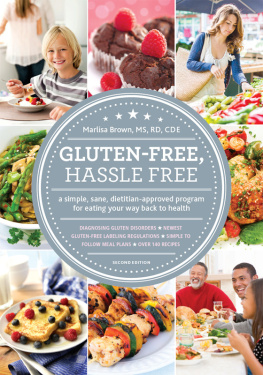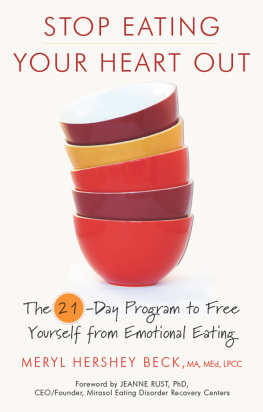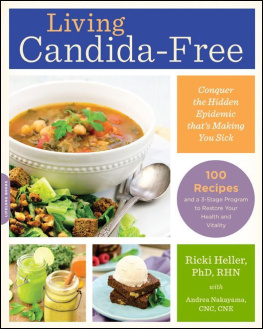Emotional Eating Learn to be free!
A guide to living well and soothing yourself in ways other than food
Dr Cate Howell OAM, CSM, PhD (Med.)
Dr Cate Howell is a GP and therapist, researcher, lecturer and author. She has over 30 years of training and experience in the health area, with a special interest in mental health and assisting individuals experiencing life stresses or crises. Cate holds a Bachelor in Applied Science (Occupational Therapy), a Bachelor of Medicine, a Bachelor of Surgery, a Masters in Health Service Management and a Doctor of Philosophy (Medicine). She has trained in Clinical Hypnosis, Couple Therapy, Cognitive Behaviour Therapy, Acceptance and Commitment Therapy and Interpersonal Therapy.
Cate worked as a counsellor for a Bariatric Surgery clinic for seven years, and she sees many clients with eating-related issues in her practice. She has travelled internationally to present research findings on a range of life and mental health topics, and has been published in a number of academic journals. Cate was awarded the Order of Australia Medal for services to medicine, particularly mental health. She has authored four books, the most recent being Listening, Learning, Caring and Counselling published by Exisle in 2016, and she regularly speaks on radio and at workshops across Australia.
Contents
Introduction
Over the years I have worked with many clients who wished to lose weight. I have seen them utilise various diets and lifestyle changes, work with dieticians, coaches and personal trainers, and undergo bariatric surgery, cognitive-behavioural therapy (CBT) and hypnotherapy. During this time, I have learnt a lot from them, and from my own life experiences. A common issue, that I have found to often get in the way of attaining the desired goals, is emotional eating (EE).Clients may become caught in a cycle of over-eating and feeling upset or guilty, perhaps moving between periods of control and feeling out of control (yo-yo dieting), all the while desperately wishing that they could be free to eat healthily and to enjoy food.
In the Emotional Eating: Learn to be free (EE-Free) program, we will begin by answering 10 of the common questions about EE, and then focus on different approaches and strategies that can help you find freedom from EE. It is important to remember that the title of this program includes learn to be free: as with learning any new activity (such as a sport or foreign language) or way of being, overcoming EE involves learning new ways of managing thoughts, feelings and behaviours. This involves effort and practice. As a result, there are practical ideas to try, and reflections and exercises to undertake. My suggestion is that you obtain a notebook to jot down your responses to these as you go along, as this will help you process the information and move towards change. The program will also provide a supportive voice and encouragement as you learn more about yourself, and it will highlight additional resources for you to tap into.
You are most likely reading this because you want to lose weight. However, you will find that the main focus in this program is making peace with yourself and finding freedom from EE. Rather than focussing on weight-loss, I invite you to focus on understanding yourself more, to find ways to honour every aspect of your whole self, and to engage with health and wellbeing. This program is about living well, and improving your health and wellbeing so that you can find freedom from EE. So, lets begin!
In summary, the EE-Free program involves:
1. Reading the e-book.
2. Working through the associated reflections and exercises.
3. Enjoying the encouragement and support the program offers.
4. Considering having one-on-one sessions with a therapist and/or dietician.
5. Checking out the recommended additional resources.
6. Looking after you, and being kind to yourself!
Part 1: Understanding Emotional Eating
What is emotional eating?
EE refers to seeking comfort and soothing emotions, such as stress, anxiety, sadness, anger, boredom or loneliness, through food. It may be that you are facing a difficult problem or dealing with stressors such as relationship, work or financial issues, and food becomes a way of dealing with the issues or stress. Food may be viewed as a reward, and stress, low mood or anxiety can also trigger overeating.
A number of triggers or cues can occur. These can be described as:
1) Internal (physical, emotional, cognitive/thinking).
2) External (environmental e.g. cold weather, or social).
EE may include thinking about food a lot of the time; eating when stressed, anxious, sad, angry, lonely or tired; rewarding yourself with food; not knowing why you are eating;eating until feeling stuffed; feeling guilty about over-eating; or having a love-hate relationship with food.
Reflections:
Do these descriptions apply to you?
Which emotions do you soothe with food (e.g. boredom, sadness)?
Is there a particular stress contributing to EE (e.g. at home, work)?
Are low mood and anxiety contributing? [If the answer is yes, seeking help from a General Practitioner (GP) or therapist may be important.]
What else do you relate to from the discussion so far?
Is habit a part of it?
Eating is a behaviour and we naturally fall into habits with respect to food and drink. For example, if we are used to eating cereals and milk each morning, we associate the morning with having cereals, so having them becomes a habit. If we associate going to the petrol station with buying not only petrol, but also lollies, soft drink or chocolate, then a new association and habit are established. If we associate being sad with eating sweet foods, then again habit can become part of the problem. We quickly learn habits, but the good news is that we can change them quite readily too!
The other aspect of habit is avoidance. It can become a habit to avoid feelings or thoughts that are uncomfortable, for example, sadness or boredom, by eating. Food may lead to the feeling disappearing for a time - only to be replaced later by other uncomfortable feelings such as frustration or guilt. Hence avoidance can work in the short term, but not in the long term!
Reflections:
Are you aware of any troublesome habits in relation to food (e.g. looking for chocolate in the evenings, always buying food when you fill the car up with petrol)?
Do want to change some of them which ones?
Do we do eatconsciously or unconsciously?
EE may happen consciously or unconsciously. Lets explain what this means. If you think of the mind as an iceberg, the conscious mind is the part of the iceberg above the water, and it involves our conscious awareness of what is around us, and our conscious thoughts and decisions. The unconscious mind is the greater mass of ice below the water, and it houses our memories of past experiences and contains a range of unconscious beliefs that we build up during our lifetime about ourselves and the world.
Experience has suggested that we may consciously choose to comfort ourselves with food or drink, or we may unconsciously look to food for comfort without realising that we are doing it. In fact, sometimes individuals can feel quite dissociated when they eat for comfort, and may describe feeling not in their body or out of it. My understanding is that the unconscious mind wants us to be content, and so it may lead us to eat for comfort, even though the result may ultimately be gaining weight and feeling distressed.
Reflections:
Does conscious (aware) or unconscious (unaware) EE apply to you?
Next page
